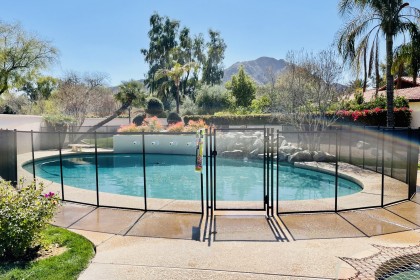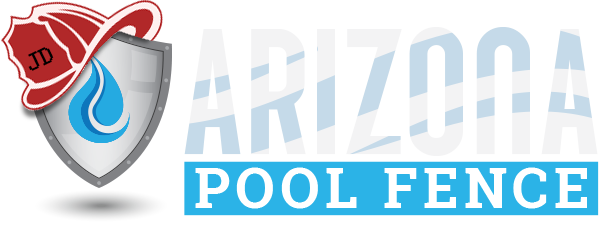Pool Gate Height and Locking Requirements in Arizona

Arizona’s warm climate and sunny skies make swimming pools and pool gates standard features in many homes. However, with the convenience of owning a pool comes the responsibility of ensuring safety. Arizona frequently reports high numbers of pool-related accidents, particularly involving children, highlighting the importance of pool safety and compliant pool gates for homeowners.
One of the best ways to enhance pool safety is by understanding and adhering to Arizona’s pool gate regulations. These laws are designed to reduce the risk of accidental drownings by requiring pools to be securely fenced and gated. A properly installed and maintained pool gate protects loved ones and helps homeowners avoid legal penalties and potential liabilities.
Arizona Pool Fence is dedicated to helping homeowners create safer environments through high-quality pool safety solutions. With expertise in designing, installing, and maintaining pool gates that meet Arizona’s legal standards, we offer customized options combining functionality and style. Our team ensures that every gate is compliant, durable, and tailored to your needs, making prioritizing safety and security easier.
By improving pool safety and selecting the right gate solutions, you can protect your family and create a safer community in Arizona.
Why Pool Gate Requirements Matter in Arizona
The Impact of Arizona’s Hot Climate
The state’s hot climate plays a large role in the widespread use of swimming pools as families seek relief from the desert heat. However, the same accessibility that makes pools appealing can also make them hazardous. With pools often located near living spaces and outdoor play areas, homeowners must have effective barriers, such as properly installed pool gates, to prevent unsupervised entry.
The Role of Pool Gates in Preventing Accidents
Pool gates are a cornerstone of pool safety, acting as a physical barrier that can significantly reduce the risk of accidental drownings. A well-designed pool gate with self-closing and self-latching mechanisms can keep children and pets from entering the pool area without supervision. Additionally, gates that meet Arizona’s regulations ensure that homeowners comply with state laws, protecting them from legal and financial repercussions.
By implementing a compliant pool gate, homeowners can create a safer environment for their families and visitors while contributing to the broader effort of reducing pool-related accidents in Arizona. With thoughtful planning and adherence to local regulations, pool gates effectively solve a serious concern, making pools safer and more enjoyable for everyone.
Key Legal Requirements for Pool Gates in Arizona
Understanding Arizona’s Pool Fence Laws (A.R.S. § 36-1681)
Arizona’s pool safety laws, outlined in A.R.S. § 36-1681, are designed to protect children and prevent accidental drownings. These regulations mandate that residential swimming pools be enclosed by barriers that meet specific safety standards. As part of these barriers, pool gates must adhere to strict guidelines to ensure effectiveness. Homeowners are required to comply with these laws not only to safeguard their families but also to avoid potential fines and liabilities.
Specific Requirements for Pool Gates in Arizona
Minimum Height: Pool gates must meet a minimum height requirement of 60 inches (five feet) to prevent easy access by small children. This height is intended to make it difficult for children to climb over the gate, ensuring the pool remains off-limits without adult supervision.
Self-Closing and Self-Latching Mechanisms: To comply with Arizona law, pool gates must have self-closing and self-latching mechanisms. This feature ensures that the gate closes securely and latches automatically after each use, reducing the risk of someone accidentally leaving it open. Additionally, the latch must be installed at least 54 inches from the ground to make it inaccessible to young children.
Outward Swinging Gates: Arizona regulations require pool gates to swing outward, away from the pool area. This design prevents children from pushing the gate inward to gain access. Outward-swinging gates are considered safer and more effective in maintaining the integrity of the pool barrier.
Importance of Gate Placement and Proximity to the Pool: The placement of the pool gate is just as important as its design. Gates should be installed strategically, providing convenient access while maintaining safety. They must be positioned to prevent direct entry into the pool area and should never obstruct emergency exits. Proper placement ensures the pool gate serves its intended purpose of keeping unsupervised individuals out of the pool area.
Penalties for Non-Compliance: Failure to comply with Arizona’s pool gate requirements can result in legal and financial consequences. Homeowners may face fines or citations for non-compliance, and in the event of an accident, they could be liable for damages. Beyond legal repercussions, neglecting these safety measures puts loved ones and visitors at risk, underscoring the importance of adhering to the law.
Common Misconceptions About Pool Gate Regulations
A common misconception is that older pools are exempt from modern safety standards due to “grandfathered” regulations. Many homeowners mistakenly believe that they don’t need to upgrade their pool gate or fence if their pool was installed before current laws were enacted. However, Arizona law requires all residential pools to meet current safety standards, regardless of when they were built. Ensuring your pool gate complies with modern regulations is essential for both legal compliance and protecting those who may access your pool.
Misunderstandings About Shared or Community Pools
Another frequent misunderstanding involves shared or community pools, such as those in apartment complexes or HOA neighborhoods. Some assume these pools are automatically compliant because a third party manages them. However, regulations for pool gates and barriers apply equally to community pools, and it’s essential to verify that these facilities meet the required safety standards. Pool users should not assume compliance but instead advocate for proper safety measures if they notice anything that contradicts the law.
The Misconception That Any Fence Qualifies as a Compliant Barrier
Many homeowners believe that any type of fence around their pool will satisfy Arizona’s legal requirements. In reality, not all barriers meet the state’s strict guidelines. For example, chain-link fences with wide gaps, climbable designs, or improperly installed gates do not qualify as compliant barriers. A compliant pool gate must include features like a minimum height of 60 inches, self-closing and self-latching mechanisms, and outward swinging capability. Ensuring your pool gate meets these criteria is essential for maintaining safety and adhering to the law.
How to Choose the Right Pool Gate for Your Home
Selecting the right pool gate is essential to ensuring both safety and compliance with Arizona’s regulations. With many options available, you can choose different fences that enhance functionality, durability, and aesthetics. Here’s what to consider when selecting a pool gate for your home.
Features to Look for in a Pool Gate
Durability and Weather Resistance: Arizona’s extreme heat, sunlight, and occasional monsoons can impact outdoor structures. A high-quality pool gate should be made from durable materials that resist rust, fading, and wear. Look for gates coated with weather-resistant finishes to extend their lifespan and maintain their appearance in the harsh Arizona climate.
Secure Locking Mechanisms: Safety is paramount when selecting a pool gate. Choose a gate with secure, self-closing, and self-latching mechanisms that meet Arizona’s pool safety requirements. Locks should be easy for adults to operate but out of reach for children to prevent unauthorized access.
Child-Proof Designs: A compliant pool gate should incorporate child-proof designs, such as latches at least 54 inches from the ground. Additionally, the gate should not have features like horizontal bars that can be climbed. This ensures that even the most determined little ones cannot gain unsupervised access to the pool area.
Material Comparisons: Pool gates are available in a variety of materials, each with its advantages:
- Wrought Iron: Offers strength and durability but requires proper maintenance to prevent rust.
- Mesh: Lightweight, flexible, and visually unobtrusive mesh gates are popular for families with children.
- Glass: Provides a sleek, modern appearance and unobstructed views but requires regular cleaning to maintain clarity.
Consider your home’s style, budget, and maintenance preferences when choosing the material for your pool gate.
Customization Options from Arizona Pool Fence
Arizona Pool Fence offers a range of customization options to ensure your pool gate meets your specific needs. From selecting the perfect material and finish to designing a gate that complements your outdoor space, we provide solutions tailored to your home. Our gates are built with safety and compliance in mind while offering a variety of styles to enhance your pool area’s aesthetic appeal.
Maintaining Your Pool Gate: Tips and Best Practices
A pool gate is one of the most important features for ensuring pool safety, but its effectiveness depends on regular maintenance. Proper care can extend the life of your pool gate and ensure it remains compliant with Arizona regulations. Follow these tips and best practices to keep your pool gate in top condition.
Regular Inspection for Wear and Tear
Inspect your pool gate regularly to identify any signs of wear and tear. Look for rust, cracks, loose screws, or warped materials that may compromise its integrity. Pay special attention to hinges and joints, as these areas are prone to damage over time. Early detection of issues can prevent costly repairs and ensure your gate continues functioning as intended.
Testing Self-Closing and Latching Mechanisms
Arizona law requires pool gates to have self-closing and self-latching mechanisms, so it’s essential to test them frequently. Open the gate and let it close on its own to ensure it shuts securely and latches properly. If the gate fails to close or latch consistently, consider adjusting the mechanisms or consulting a professional for repairs.
Cleaning and Weatherproofing to Extend Gate Life
Arizona’s intense sun, dust, and occasional rain can affect your pool gate. Clean the gate regularly using mild soap and water to remove dirt and grime. Apply a protective coating or paint for metal gates to prevent rust and fading. If your gate includes glass or mesh components, clean them with appropriate products to maintain their appearance and functionality.
When to Replace or Upgrade Your Pool Gate
Even with regular maintenance, pool gates can wear out over time. If your gate shows signs of severe rust, structural damage, or persistent malfunctioning, it may be time for a replacement. Upgrading to a newer, more secure gate can improve safety and ensure compliance with current Arizona regulations. Additionally, if your current gate no longer suits your aesthetic preferences, an upgrade can enhance the overall appearance of your pool area.
How Arizona Pool Fence Can Help
When it comes to ensuring pool safety and compliance with Arizona’s strict regulations, Arizona Pool Fence is the trusted partner homeowners can rely on. With a wide range of services and a commitment to quality and safety, we provide solutions that protect your loved ones while enhancing the appearance of your pool area.
Comprehensive Pool Safety Services
Arizona Pool Fence designs, installs, and maintains high-quality pool gates and fences. Whether you need to secure a residential pool or upgrade an existing barrier, our team has the expertise to handle every aspect of pool safety. We prioritize durability, functionality, and aesthetic appeal, ensuring your pool area meets legal requirements and looks great.
Customized Solutions for Every Home
We understand every property is unique, and pool safety solutions should be tailored to fit specific needs. Arizona Pool Fence offers customized options that align with Arizona’s pool gate laws, including compliant materials, secure locking mechanisms, and weather-resistant designs. Our team works closely with homeowners to create gates and fences that blend seamlessly with their outdoor spaces while prioritizing safety.
Professional Installation and Maintenance
Proper installation is key to the effectiveness of any pool gate or fence. Our skilled technicians ensure that every product is installed to meet both state regulations and the highest safety standards. Additionally, we offer maintenance services to keep your gate in excellent condition, including inspections, repairs, and adjustments to self-closing mechanisms.
Educating and Supporting Homeowners
At Arizona Pool Fence, we believe informed homeowners are safer homeowners. That’s why we’re dedicated to providing education and support about pool safety requirements. Our team can always answer questions, offer guidance, and ensure you feel confident in your pool safety choices.
Frequently Asked Questions About Pool Gates in Arizona
What is the minimum height for a pool gate?
Arizona’s minimum height for a pool gate is 60 inches (five feet) from the ground. This requirement prevents young children from climbing over the gate and accessing the pool area unsupervised. Ensuring your gate meets this height is a key step in complying with Arizona’s pool safety regulations.
Can a pool gate swing inward?
No, Arizona law requires pool gates to swing outward, away from the pool area. This design prevents children from pushing the gate inward to access the pool. Outward-swinging gates are considered safer because they make it more difficult for unsupervised individuals to enter the pool area.
Are mesh pool gates compliant with Arizona laws?
Yes, mesh pool gates can comply with Arizona’s regulations, provided they meet specific requirements. The mesh must be strong enough to withstand pressure and prevent climbing. Additionally, the gate must include self-closing and self-latching mechanisms, meet the 60-inch height requirement, and swing outward. Mesh gates are a popular option for their flexibility and aesthetic appeal, but ensuring they are correctly installed and maintained is essential.
How often should pool gates be inspected?
Pool gates should be inspected regularly to ensure they remain functional and compliant with safety standards. It’s a good practice to check your gate at least once a month, paying close attention to the self-closing and latching mechanisms, as well as the overall condition of the gate and surrounding fence. Regular inspections help identify issues early and maintain a safe pool environment.
The Importance of Pool Gate Compliance
Ensuring compliance with pool gate regulations in Arizona is not just about following the law—it’s about protecting your loved ones and preventing accidents. A properly installed and maintained pool gate can make all the difference in creating a safe environment for your family, friends, and the community. By understanding the requirements and prioritizing regular maintenance, you can enjoy peace of mind knowing your pool area is secure.
Pool safety starts with taking proactive steps. Whether upgrading an outdated gate, choosing the right materials, or ensuring your gate is installed correctly, every effort contributes to a safer pool environment. Arizona Pool Fence is here to guide you through the process, offering expert solutions tailored to meet both safety standards and your aesthetic preferences.
Don’t wait to take action on pool safety. Contact Arizona Pool Fence today for a free consultation. Our professionals will work with you to design, install, and maintain a pool gate that keeps your family safe and meets all legal requirements.





























